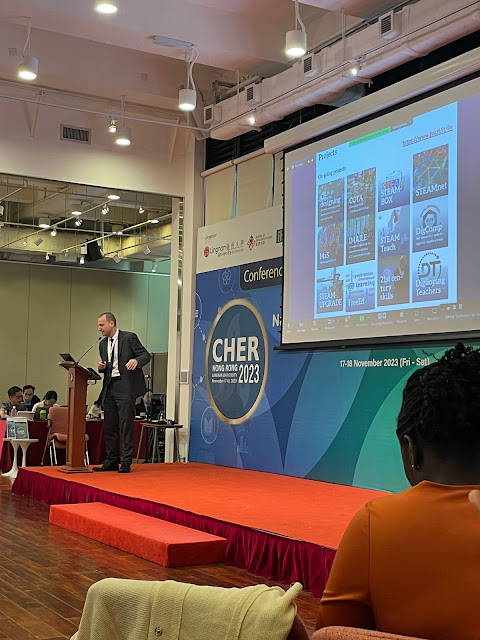Tänään ollaan Hong Kongissa, Lingnanin yliopistolla juttelemassa tekoälyn hyödyntämisestä opetuksessa.
...Ja Jetlagissa. Today we are in Hong Kong, at Lingnan University, talking about the use of artificial intelligence in teaching.
...And in Jetlag.Tämä konferenssi on myös melkoinen scholar reunion, tutkijoiden kohtauspiste, sillä tällä kertaa mukana väikkäriopiskelijani Antti Ruonalan lisäksi ovat myös Prof. Henri Pirkkalainen ja Henri Jalo, Tampereen yliopistosta, Tore Hoel Oslo Metropolitan universitystä (ja Zhuhai'sta!) sekä unkarilainen JYU kollegani, Kristof Fenyvesi, joka myös piti keynote puheen liittyen kestävän kehityksen teemoihin.
This conference is also quite a Scholar reunion, a meeting point for researchers, because this time, in addition to my fellow student Antti Ruonala, there are also Prof. Henri Pirkkalainen and Henri Jalo, from Tampere University, Tore Hoel from Oslo Metropolitan University (and Zhuhai!) and my Hungarian JYU colleague, Kristof Fenyvesi, who also gave a keynote speech related to the themes of sustainable development.
Generatiivisen tekoälyn sovellukset puhuttavat panelisteja ja esitysten pitäjiä täällä tänään. Kristof nosti myös tekoälyn sähkön käyttövaikutukset ja siihen liittyvät mielenkiintoiset kysymykset:
Applications of generative artificial intelligence are talking to panelists and presenters here today. Kristof also raised the electricity use effects of artificial intelligence and the related interesting questions:
- Now it is already known that ChatGPT consumes a huge amount of computer power: How can the artificial intelligence of the future be included in the everyday life of consumers, if only part of the world is able to pay enough for the electricity required by artificial intelligence... Inequality is increasing in the world.
Kysymys siitä, miten voisimme hyödyntää tekoälyä ilmastonmuutoksen pysäyttämiseen ja kestävään kehitykseen on edelleen kesken. Emme voi tietää millaisten robottien kanssa tulemme elämään 3, 5 tai 10 vuoden kuluttua.The question of how we could use artificial intelligence to stop climate change and promote sustainable development is still open. We cannot know what kind of robots we will be living with in 3, 5 or 10 years.
Tore and I also met 10 years ago at a Chinese conference, that time in Shanghai.Toren kanssa tapasimme 10v sitten myös kiinalaisessa konferenssissa, sillä kertaa Shanghaissa. Tänään pystymme toteamaan, että 10v aikana maailma on muuttunut niin, että länkkäritutkija pystyy melko helposti kääntämään ja lukemaan kiinalaisia tieteellisiä artikkeleja mm. Deepl -tekoälysovellusten avulla. Maailma on siis muuttunut jo sen myötä, miten tekoäly meitä auttaa. Voimme vain arvailla, mitä se tulee olemaan tulevaisuudessa.
Today, we can state that the world has changed in 10 years in such a way that a link researcher can quite easily translate and read Chinese scientific articles, e.g. With the help of Deepl AI applications.
So the world has already changed with how artificial intelligence helps us. We can only guess what it will be in the future.
The question will also be - will we meet again in China in 10 years...Kysymys lienee myös - tapaammeko uudestaan Kiinassa 10 vuoden päästä...




















